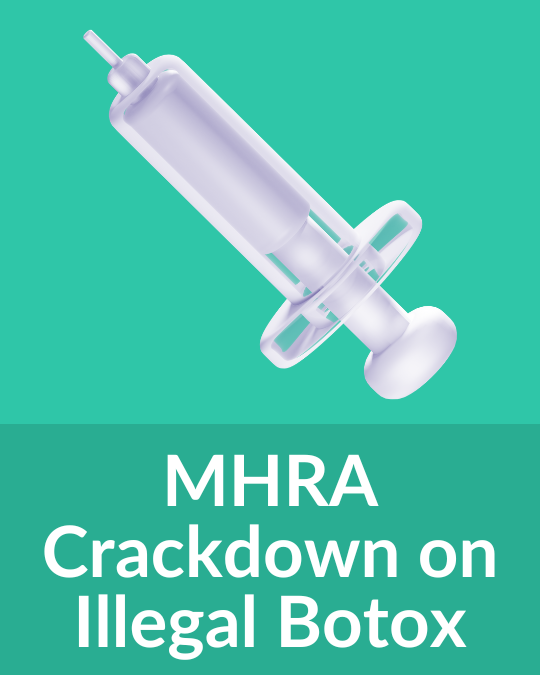In a previous blog post, we discussed urgent warnings from the UK Health Security Agency (UKHSA) about botulism cases linked to unlicensed aesthetic products. Since then, the situation has intensified. The Medicines and Healthcare products Regulatory Agency (MHRA) has launched a national crackdown on the illegal trade in unlicensed botulinum toxin products, as the number of confirmed cases and hospitalisations continues to rise.
This latest action, backed by the Department of Health and Social Care, makes it clear that safety and regulation are of the utmost importance in the aesthetics industry.
MHRA Launches Criminal Investigations
The MHRA’s Criminal Enforcement Unit has begun a series of investigations into the sale and use of unlicensed botulinum toxin products. Between 4 June and 6 August 2025, 41 confirmed cases of botulism, a rare but life-threatening condition causing paralysis, were reported in England.
Investigations show that some individuals are obtaining unlicensed products from illegal suppliers and administering injections in unsafe, informal environments such as bedrooms, kitchens, and mobile beauty settings. Social media adverts offering “quick, cheap results” have been used to lure in clients.
Since May 2023, the MHRA has seized over 4,700 vials of unlicensed botulinum toxin. Nearly all of these products were sold under brand names such as Botulax, reNTox, Innotox, and Toxpia, none of which are authorised for sale in the UK.
Government Promises to “Use the Full Force of the Law”
The government has made clear its intent to target those profiting from unsafe, illegal aesthetic procedures.
This marks a decisive move towards tighter regulation and criminal accountability within the beauty and aesthetics sector, an industry that has long awaited clearer standards and safeguards.
Understanding the Health Risks
Botulinum toxin is a prescription-only medicine, meaning it should only be supplied under the supervision of a qualified prescriber such as a doctor, nurse prescriber, or pharmacist, and administered according to a Patient Specific Direction (PSD).
Using unlicensed or counterfeit products carries serious risks, including exposure to unknown ingredients, incorrect concentrations, and contamination. Botulism symptoms can take up to four weeks to appear and include:
- Difficulty swallowing or speaking
- Breathing difficulties
- Muscle weakness or paralysis
Anyone experiencing these symptoms after a cosmetic procedure should seek immediate medical help via NHS 111 or emergency services.
How Advantage Accreditation Supports Safe Practice
We review and approve training providers across the beauty and aesthetics sector. Our CPD-accredited courses are benchmarked for safety, quality, and compliance, ensuring that learners are equipped to meet the expectations of regulators, insurers, and clients alike.
Key Takeaways
- 41 cases of botulism have been confirmed across England, linked to unlicensed Botox-like products.
- The MHRA has launched criminal investigations and seized thousands of unlicensed vials.
- Government ministers have vowed to pursue those responsible through the courts.
Contact us to learn how our accreditation can help your organisation stay compliant and trusted.

